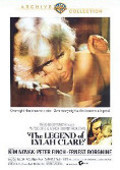
Directed by
Robert Aldrich
130 minutes
Rated M
Reviewed by
Bernard Hemingway

The Legend Of Lylah Clare
After the huge commercial success of his mainstream 1967 WWII action film, The Dirty Dozen, director Robert Aldrich set up his own production company and went in a very different direction with The Legend of Lylah Clare, a story of an egotistical movie director, Lewis Zarken (Peter Finch), who after 20 years in the doldrums after the tragic death of his star/wife/muse, Lylah Clare (Kim Novak), is making a comeback movie about her with an aspiring starlet, Elsa Brinkmann (Kim Novak), who looks and sounds uncannily like Lylah.The Legend of Lylah Clare is one of those films that are so wrong but of such an order that it is impossible to tell how much of the wrongness is intentional. The basic idea of portraying the cut-throat world of Hollywood has yielded plenty of fine films, classic examples of which are Vincent Minnelli’s The Bad and The Beautiful (1952) and Godard’s Contempt (1963), but whether Aldrich’s is trying to add to the field or enthusiastically parodying it is not clear.
His primary point of stylistic reference seems to be the “giallo”, low budget slasher-horror movies that began emerging from Italy in the mid-late 1960s. Aside from having various Italian characters, a similar garishly colour-saturated look, and at times obviously dubbed sound, The Legend of Lylah Clare has a (quite restrained) knifing scene which is replayed three times in red, white and green monochrome, although if anything suggests the cheesy excessiveness of the style it is Elsa’s intermittent “possession” (apparently) by the spirit of Lylah who as it turns out is a bisexual with a voice like Marlene Dietrich.
The difficulty is in knowing how to respond to Aldrich’s treatment of this material. Initially it appears to be an attempt at serious drama with serious actors in the form of Finch and Novak and some occasional over-acting largely thanks to Ernest Borgnine as a vulgar studio boss. But gradually it all becomes so flagrantly excessive as to remove any doubt about its parodic intent (this applies particularly to the film’s denouement from a confrontation in a purple streamer-bedecked dressing room between Zarken and Elsa which leaves her laughing demonically, to a rabid dog-food TV commerical, a marvel of symbolic unsubtlety). But if the latter is the case, why? Why for Aldrich and why for Finch and Novak (although she did appear in David Hemming’s similar ludicrous 1976 film, Just A Gigolo, so perhaps she had a taste for this sort of thing). Perhaps it is better not to ask. Either enjoy the trashy wrongness or forget about it.
Want something different?





